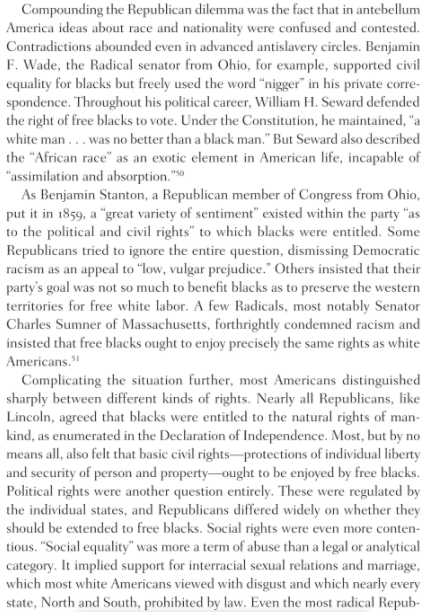Eric Foner explains antebellum American racism.
- Type
- Book
- Source
- Eric Foner Non-LDS
- Hearsay
- Secondary
- Reference
Eric Foner, The Fiery Trial: Abraham Lincoln and American Slavery (New York: W.W. Norton, 2011), 118
- Scribe/Publisher
- W.W. Norton
- People
- Benjamin Stanton, Eric Foner, Charles Sumner, Benjamin F. Wade, Abraham Lincoln, William H. Seward
- Audience
- Reading Public
- Transcription
Compounding the Republican dilemma was the fact that in antebellum America ideas about race and nationality were confused and contested. Contradictions abounded even in advanced antislavery circles. Benjamin F. Wade, the Radical senator from Ohio, for example, supported civil equality for blacks but freely used the word "nigger" in his private correspondence. Throughout his political career, William H. Seward defended the right of free blacks to vote. Under the Constitution, he maintained "a white man. . . was no better than a black man." But Seward also described the "African race" as an exotic element in American life, incapable of "assimilation and absorption." As Benjamin Stanton, a Republican member of Congress from Ohio, put it in 1859, a "great variety of sentiment" existed within the party "as to the political and civil rights" to which blacks were entitled. Some Republicans tried to ignore the entire question, dismissing Democratic racism as an appeal to "low, vulgar prejudice." Others insisted that their party's goal was not so much to benefit blacks as to preserve the western territories for free white labor. A few Radicals, most notably Senator Charles Sumner of Massachusetts forthrightly condemned racism and insisted that free blacks ought to enjoy precisely the same rights as white Americans. Complicating the situation further, most Americans distinguished sharply between different kinds of rights. Nearly all Republicans, like Lincoln, agreed that blacks were entitled to the natural rights of mankind, as enumerated in the Declaration of Independence. Most, but by no means all, also felt that basic civil rights—protections of individual liberty and security of person and property—ought to be enjoyed by free blacks. Political rights were another question entirely. These were regulated by the individual states, and Republicans differed widely on whether they should be extended to free blacks. Social rights were even more contentious. "Social equality" was more a term of abuse than a legal or analytical category. It implied support for interracial sexual relations and marriage, which most white Americans viewed with disgust and which nearly every state, North and South, prohibited by law.
- Citations in Mormonr Qnas
The B. H. Roberts Foundation is not owned by, operated by, or affiliated with the Church of Jesus Christ of Latter-day Saints.

